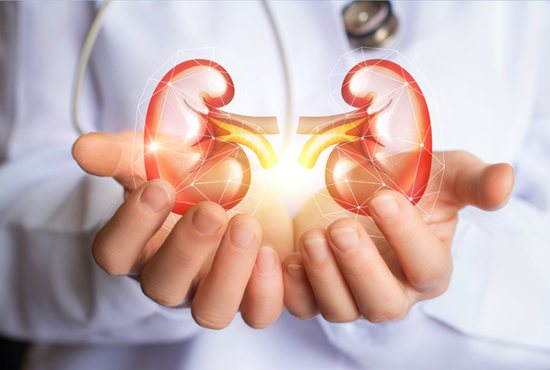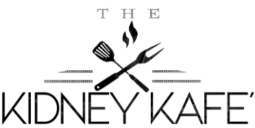Become A Donor

Chet Bennett's Journey
Chet Bennett, founder of Bennett Career Institute and the C Alan Foundation, knows exactly how important donors are in the fight against kidney disease. A recipient of this wonderful life saving gift, he continues to advocate for those facing this disease and and encourages those who wants to make a difference. Watch his journey:
Play Video
Watch Video
Chet's Story
I grew up with very low self esteem and food was my life, my energy, my friend. Honey buns, potato chips, candy bars, cookies, lemon cake, ice cream, sweet potato pie, French fries, chicken wings, steak, cheeseburgers and pork chops are still to this day some of my favorite foods. However, eating these foods everyday became a problem.
At age 26 I started high blood pressure medicine and at age 38 I was a borderline diabetic and by 42 I was a diabetic. Being an emotional eater means when I’m happy or sad I want to eat; I was eating all the time. My highest weight was 272 pounds and I was miserable, which meant I ate even more. I would go to the popular fast food restaurant and get two large combo meals and two dollar double cheeseburgers and ate everything in one setting. I just loved to eat!
When I was diagnosed with kidney failure, I knew exactly where it came from. When I moved to Atlanta, Georgia to attend Morehouse College, I really started eating the southern seasoned food every day. I would go to all of the buffet restaurants, the soul food restaurants and church dinners. I was diagnosed with gout (a form of arthritis) in my early twenties from eating all the seasoned food. The medication to rid the gout began to affect my kidneys. My physician Dr. Koritzinsky told me if I kept going down that path I would be on dialysis and twenty years later that is exactly what happened.
The Kidney Kafe was birthed out of my love for food and my desire to change the way we perceive healthy eating. Many African Americans think vegan or alternative food isn’t good before they even try it. I want to create dishes with a southern feel but without the salt and sugar. Pastries that melt in your mouth without the guilt of eating sugar. Food, if I want to consume as much as I want, it wouldn’t hurt me. That’s the purpose of the Kidney Kafe. Beautiful colors, presentation and taste.
I like to name my dishes as I prepare them because I feel a personal connection with each dish. My mission is to birth a chain of Kidney Kafes in underserved communities where sustainable food may not be readily available. It will be a fast food model that will assist with healthy eating without compromise. A Kidney Kafe Food Truck will deliver fresh, healthy options at no charge to senior buildings, homeless shelters, and especially churches. Finally, I want a farm to grow herbs, fruits, and vegetables that will be used to develop spices and seasonings for the Kidney Kafe. Our motto is “From the ground to the gut.”
C. Alan aka Chef Benne’
Interested in Becoming a Donor?
Please complete the following form for more information.
Contact the National Kidney Foundation for Information & Resources
INFORMATION
BECOMING A DONOR
What is a living donation?
Living donation can also come from someone who is emotionally related to the recipient, such as a good friend, spouse or an in-law (living unrelated donation). Thanks to improved medications, a genetic link between the donor and recipient is no longer required to ensure a successful transplant.
In some cases, a living donation may even be from a stranger, which is called anonymous or non-directed donation.


Who can donate a kidney?
To donate a kidney, you must be in good physical and mental health.As a general rule, you should be 18 years or older. You must also have normal kidney function. There are some medical conditions that could prevent you from being a living donor. These include having uncontrolled high blood pressure, diabetes, cancer, HIV, hepatitis, or acute infections. Having a serious mental health condition that requires treatment may also prevent you from being a donor.
What are the advantages of living donation over deceased donation?
Kidney transplants performed from living donors may have several advantages compared to transplants performed from deceased donors:
- Some living donor transplants are done between family members who are genetically similar. A better genetic match lessens the risk of rejection.
- A kidney from a living donor usually functions immediately, because the kidney is out of the body for a very short time. Some deceased donor kidneys do not function immediately, and as a result, the patient may require dialysis until the kidney starts to function.
- Potential donors can be tested ahead of time to find the donor who is most compatible with the recipient. The transplant can take place at a time convenient for both the donor and recipient.


Are there different types of living donation?
Directed donation
Nondirected donation
What questions should I ask before considering living donation?
Donating an organ to someone else is a big decision. These questions will help you explore your feelings, your relationship (if any) to the donor, your expectations, your motivation for donating, and whether or not you are ready and willing to donate.
My Knowledge
- Why do I want to donate my organ to someone else?
- Do I feel I have received enough education and information to make an informed decision to donate? Do I have any unanswered questions?
- Have I considered all the benefits and risks of donation to myself and my family?
- Have I adequately considered and prepared myself for the risks of surgery?
- Will anyone be upset with me if I do not donate? If so, who?
My Knowledge
- Am I in good physical shape and able to withstand surgery?
- Am I prepared to deal with post-operative pain and discomfort from surgery?
- Is there anything I need to do to improve my physical health and make recovery easier, such as exercising, quitting smoking, or losing weight? Will I need help or support to do this?
- Am I able to manage my recovery period without falling into problems, such as depression, anxiety, nervousness, boredom? Am I prepared emotionally and financially to seek psychological counseling or help if I need it?
- Can I handle a complication that may delay my recovery?
My Emotions
- Have I been honest with myself about why I want to donate an organ?
- Am I expecting anything in return for my donation? (For example, am I hoping for attention, gratitude, a better relationship with the recipient, or other things?) If so, how will I feel if I do not get these things?
- Who can I rely on for practical and emotional support during surgery and recovery?
- How will I feel if the recipient is not grateful in the way I imagined?
- How will I feel if the recipient doesn’t take care of my donated organ after receiving it?
- Will I be able to cope if my relationship with the recipient becomes strained or difficult?
- How will I feel if the organ fails?
My Finances
- How would living donation affect me financially? Would I lose wages during my recovery? Am I able to get paid leave from my employer?
- Have I thought about my other obligations and how I will manage them during my recovery period (such as a demanding job, volunteer commitments, young children)?
- Will I be changing my job or occupations in the near future? If so, how would living donation affect my future employability? Life insurance?
- Have I thought about what might happen if I have any unexpected health complications from the procedure? Do I have a plan in place for my dependents if I have an unexpected outcome?
{Cited: Marjorie A. Clay. Education of the donor by the ILDA (Psychosocial Aspects). In: Jennifer Steel, Ed. Living Donor Advocacy: An Evolving Role within Transplantation. New York, NY Springer; 2014: 169-195.}
